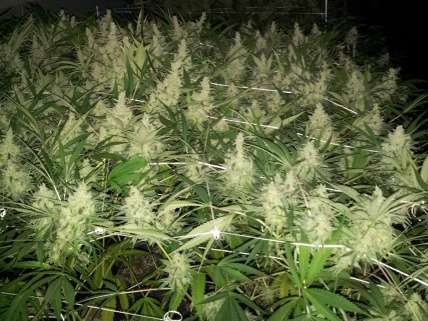Despite Medical Marijuana, Pot Smell Justifies Searches in Arizona
The state's top court rules that the odor of plants or burnt bud provides probable cause "in most circumstances."

In a pair of cases decided yesterday, the Arizona Supreme Court ruled that the smell of marijuana still generally supplies probable cause for a search in that state, nothwithstanding the legality of medical use. Since the Arizona Medical Marijuana Act (AMMA) allows possession and cultivation only for people who meet specified conditions, the court reasoned, "the odor of marijuana in most circumstances will warrant a reasonable person believing there is a fair probability that contraband or evidence of a crime is present."
One of the cases involved Ronald Sisco, whose indoor growing operation at a Tucson storage facility was discovered in 2013 after police obtained a warrant based on "a strong odor of fresh marijuana." The other case involved Ian Cheatham, whose car was pulled over in 2013 based on suspicion of illegal window tinting and searched based on a "pretty strong" odor of burnt marijuana emanating from the vehicle, in which police found a small amount of pot under the driver's seat. Both defendants argued that in light of AMMA—which allows a patient with a state-recognized "debilitating medical condition" and a doctor's recommendation to possess up to two-and-a-half ounces of marijuana and to grow up to 12 plants at home if he lives more than 25 miles from the nearest dispensary—what used to be incriminating smells no longer suffice to justify a search. The court disagreed (citations omitted):
AMMA did not decriminalize the possession or use of marijuana generally….Instead, AMMA makes marijuana legal in only limited circumstances. Possession of any amount of marijuana by persons other than a registered qualifying patient, designated caregiver, or medical marijuana dispensary agent is still unlawful, and even those subject to AMMA must strictly comply with its provisions to trigger its protections and immunities. Thus, when an officer detects marijuana by sight or smell, the "degree of suspicion that attaches" remains high, notwithstanding AMMA. A reasonable officer is therefore justified in concluding that such sight or smell is indicative of criminal activity, and thus probable cause exists.
The court added that other considerations, such as the presentation of a patient ID card issued by the Arizona Department of Health Services, might negate what would otherwise be odor-based probable cause. "Because probable cause is determined by the totality of the circumstances, and marijuana possession or use is lawful when pursuant to AMMA," it said, "a reasonable officer cannot ignore indicia of AMMA-compliant marijuana possession or use that could dispel probable cause." Neither Sisco nor Cheatham was a state-registered patient.
If Arizona did "decriminalize the possession or use of marijuana generally," the court noted, "our analysis and conclusion in this context might well be different." Courts in Alaska and Massachusetts have ruled that decriminalization means the smell of pot by itself is no longer provides probable cause for a search. An initiative that is expected to be on Arizona's ballot in November would legalize the production, distribution and possession of marijuana for recreational use.
A lawsuit filed yesterday by Maricopa County Attorney Bill Montgomery and other prohibitionists seeks to block that initiative. Among other things, the plaintiffs argue that the initiative summary presented to petition signers is legally indadequate and that the measure violates the state constitution's Gift Clause by giving licensing preference to current operators of medical marijuana dispensaries.
Editor's Note: As of February 29, 2024, commenting privileges on reason.com posts are limited to Reason Plus subscribers. Past commenters are grandfathered in for a temporary period. Subscribe here to preserve your ability to comment. Your Reason Plus subscription also gives you an ad-free version of reason.com, along with full access to the digital edition and archives of Reason magazine. We request that comments be civil and on-topic. We do not moderate or assume any responsibility for comments, which are owned by the readers who post them. Comments do not represent the views of reason.com or Reason Foundation. We reserve the right to delete any comment and ban commenters for any reason at any time. Comments may only be edited within 5 minutes of posting. Report abuses.
Please to post comments


Fourth Amendment Kryptonite: "I smell marijuana."
I gotta say, I can't really argue that a cloud of pot smoke emanating from a car gives reasonable suspicion that a law has been broken.
The law being driving while intoxicated. Not sure why investigating the driver's mental condition requires a search of the car, though. IOW, it justifies testing the driver, not searching the car.
Maryland lawmakers enacted a law criminalizing the smoking cannabis a crime when done in a motor vehicle. That was to get around the annoyance of the loss of probable cause after the State decriminalized petty possession up to 10 grams.
My friend just told me about this easiest method of freelancing. I've just tried it and now I am gettiing paid 18000 usd monthly without spending to much time. you can also do this.
==== http://www.CareerPlus90.com
Anti-rightist police states are so hard to give up. And make no mistake about it, Arizona is a hard-core, anti-rightist police state....but then, so is the federal government and most other states, too.
Anti-rightist defined: Governments are anti-rightist if they pass laws that criminalize the following.
Non-violent, non-coercive, non-larcenous, consensual adult behavior that does not physically harm other people or their property, that does not directly and immediately threaten other people and their property, that does not disturb the peace, and that does not create a nuisance in public.